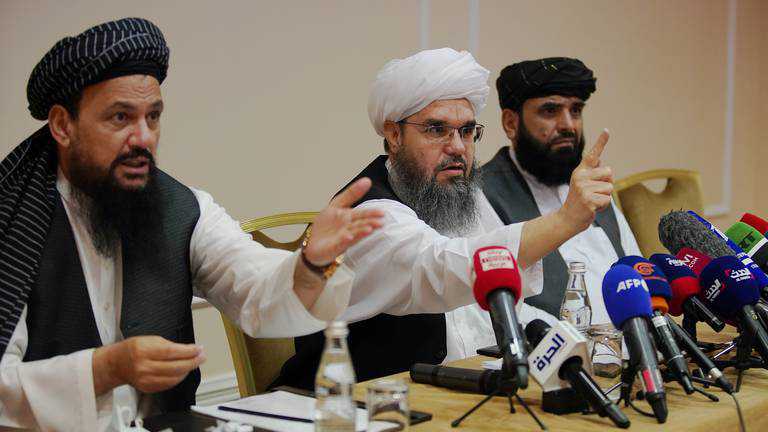Taliban claim to control most of Afghanistan
11 July, 2021

A Taliban official said on Friday that the insurgents have seized of 85 per cent of territory in Afghanistan.
This claim was dismissed by experts, even as government officials expressed concern about the insurgents' gains in border areas.
“We control 250 of the 398 districts — that is, 85 per cent of the Afghan soil under our control,” Shahabuddin Delawar, one of a three-member Taliban delegation, told reporters in Moscow, after talks with Russian officials.
However, the claim was dismissed by independent experts tracking Afghanistan's conflict.
“The Taliban have routinely expressed inaccurate and exaggerated claims of how much territory they control in Afghanistan, and this claim was no different,” Jonathan Schroden, director at CNA, a non-profit research and analysis organisation, told The National.
“It’s propaganda, plain and simple.”
According to the Long War Journal, which maps the shifting control lines in the Afghan conflict, the Taliban hold sway in 205 districts. It says the number of districts under the government’s absolute control has dropped to 74, while 120 remain contested.
The Taliban claim follows concerted attacks on provincial centres, as well as border towns and trade points, which have raised concerns among regional stakeholders about the fighting spilling across the borders.
More than 1,000 Afghan soldiers crossed into Tajikistan, which hosts a Russian military base, after battles near the border this week.
Russia noted the increased tensions at the Afghan-Tajikistan border in its meetings with the Taliban on Friday, pointing out that the group occupies “a large part of border districts and currently controls about two-thirds of the border”.
“[We] urged [the Taliban] not to allow these tensions to spread outside the country,” Maria Zakharova, the Russian Foreign Ministry spokeswoman, said.
The group gave assurances “that they would not violate the borders of the Central Asian countries”, she said.
Similar concerns were raised by Iran, which has a border of almost 1,000 kilometres with Afghanistan, during a meeting with the Taliban and Afghan delegations in Tehran on Wednesday.
“We warn the Taliban not to get close to Iranian borders. This is Iran’s red line,” Shahriar Heidari, deputy head of the Iranian parliamentary committee on national security, told local media.
Taliban officials are currently meeting leaders of regional powers as the US and Nato forces withdraw from Afghanistan.
US President Joe Biden said on Thursday that the American troop withdrawal would be completed in August.
The Taliban’s increased attacks on borders have affected trade, Afghan Finance Ministry spokesman Rafi Tabee told The National.
“As a result of the attacks, customs and operations on these borders have been suspended, affecting businesses in Afghanistan,” Mr Tabee said.
“These borders and customs, along with the air corridor, are crucial to Afghan trade and connect our businesses to Central Asia and Europe.”
Mr Tabee blamed Pakistan, which is known to support and shelter the Taliban, for the increased attacks on trade routes, pointing out that the border with Pakistan had not been affected.
“The borders that were targeted are those operating independent of Pakistan and they don’t benefit from it,” he said.
“They don’t want Afghanistan to be economically independent of Pakistan.
“Even with the air corridor we share with the region, the fighting will impact our exports,” he said.
In one of the most significant border gains, the Taliban seized the Islam Qala crossing on the Afghan-Iran border in northern Herat province on Thursday. The insurgent group took over the town of Torghundi, a trade crossing with Turkmenistan, the same day.
However, an Afghan government official insisted that Afghan forces are battling the Taliban at Islam Qala.
“All Afghan security forces including the border units are present in the area, and efforts are under way to retake the site,” Interior Ministry spokesman Tareq Arian told reporters on Thursday.
Islam Qala is not only an important trade route but also hosts one of the largest humanitarian operations in Afghanistan to support the hundreds of Afghans deported from Iran every day.
Inter-governmental body the International Organisation for Migration said it had to restrict operations and evacuate staff from Islam Qala on Wednesday, after days of fighting and Taliban attacks.
“The Taliban have had control of Islam Qala township for three days, and the Kohsan district administrative centre fell [Thursday] morning,” Nicholas Bishop, an IOM emergency response officer, told The National.
Earlier this year, IOM had to evacuate its staff from Spin Boldak in Kandahar, on the border with Pakistan, he said.
“Borders are increasingly being targeted by the Taliban; in Nimruz, the Kang district was taken on Wednesday, which is not far from Zarang, which is the site of a border crossing from Iran as well,” Mr Bishop said.
“Borders represent a lot of revenue and control. They are definitely a target for takeovers.”
Mr Schroden, the CNA director, said targeting borders and ports was not only an attempt to disrupt supply chains but also to isolate the country.
“The Taliban’s capture of border towns fits with their strategy of attempting to isolate and lay siege to Afghanistan’s major cities,” he said.
“It also appears to be part of an effort to proactively cut off foreign aid routes to resistance militias that have formed or are forming in the north and west of the country,” he said, referring to local uprisings across against Taliban sieges in several provinces.
Source: www.thenationalnews.com
TAG(s):
